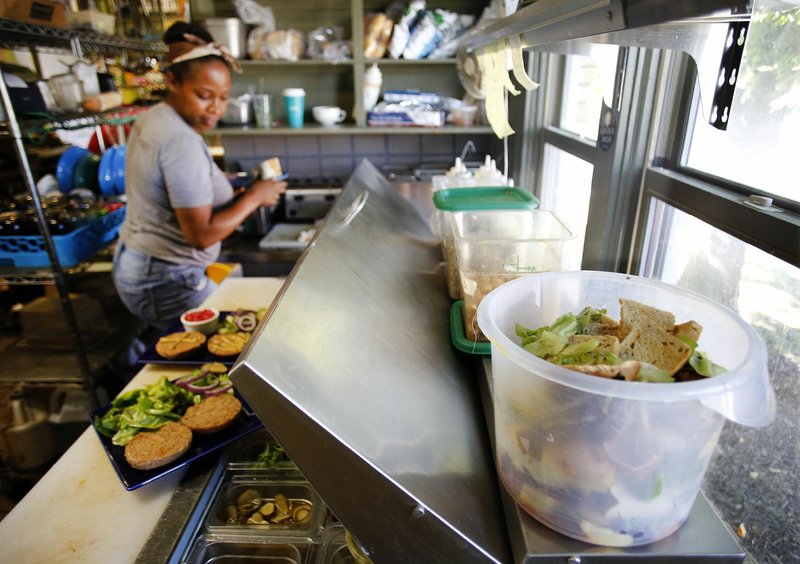FAYETTEVILLE — Businesses and homes would be encouraged to recycle their food rather than throw it away if the city adopts recent recommendations aimed at diverting more trash from the landfill.
On the Web
To read the report, go to: bit.ly/faytrashmasterplan
Stacy Ryburn can be reached by email at sryburn@nwadg.com and on Twitter @stacyryburn.
City officials on Tuesday got their first glimpse of the Solid Waste Reduction, Diversion and Recycling Master Plan from Florida-based Kessler Consulting. The City Council in December 2013 set a goal to divert 80 percent of Fayetteville’s waste from the landfill to recycling, reuse or composting by 2025.
The 111-page report calls for, among other initiatives, a plan to prevent food from ending up in the trash by recovering edible foods for the hungry and recycling the rest.
“Food waste represents one of the greatest opportunities for the City to increase its diversion rate,” according to the report, which said food accounted for about 35 percent of the city’s waste in 2015.
The number of communities in the United States with curbside food waste collection has grown from 24 municipalities in 2005 to 198 in 2014, according to the report. The number of households these programs serve has increased from fewer than 600,000 in 2005 to 2.7 million in 2014, it said.
The master plan could raise Fayetteville’s waste diversion to 50 percent within the next decade. A lot has to happen between now and then to achieve that goal, and even more to get to the 80 percent mark, said Brian Pugh, the city’s waste reduction coordinator.
“It’s a road map for us to get to that diversion level,” he said. “It’s up to the City Council to determine if they want us to do that. Even though it’s laid out there, we still have to present to them a plan.”
PILOT PROGRAM
The city conducted a commercial food waste composting pilot for a 21-week period from January to June. Participants included six restaurants, Happy Hollow Elementary School, the Fayetteville Senior Activity Center and four sites at the University of Arkansas, according to the report.
Crews picked up 64-gallon carts from each place three times per week. Just more than 69 tons of food scraps made its way to the city’s compost on Happy Hollow Road by the end of the pilot, the report states.
The city can only compost yard waste now. The Arkansas Department of Environmental Quality requires a special permit for food waste but granted the city permission to compost organic material during the pilot test period, Pugh said.
Pugh’s department has started the process of getting the permit, he said. The City Council is tentatively scheduled to discuss the master plan on Dec. 6. Establishing a voluntary commercial food waste program is among the first measures of the plan.
Turning the food scraps into compost took about two months, Pugh said, as opposed to six months or so for yard waste. The city makes its compost available for sale at its 3-acre compost site.
The modified static aerobic pile method expedited the process to turn food into compost. Crews put down a bed of mulch and yard waste, put the food waste on top and capped everything with another mulch and yard waste mixture. A nontoxic powder enzyme covered the pile, which, with water added, went to work quickly, Pugh said.
“It’s really fascinating,” he said. “I had never worked with that before and really didn’t know what to expect.”
Adding a layer of halfway composted material on top of everything served as a biofilter, keeping the stench at bay. Not turning the mixture, like the city normally does with yard waste compost, also helped, Pugh said.
“We didn’t notice a very offensive smell at all during this process,” he said. “That’s of key concern, because there have been commercial composting operations shut down in different states because of the smell.”
The composting process is less expensive than paying to use the landfill, creating an opportunity to save money, Pugh said.
The city got a good response from the participants in the pilot. The Farmer’s Table Cafe already had a zero-food-waste policy before joining the program, said Adrienne Shaunfield, co-owner.
The restaurant has several buckets just for food scraps all over the kitchen. Local farmers come by every day to pick up the scraps and use them for compost or animal feed, Shaunfield said.
Being a part of the pilot took some adjustment for the staff, but it had its benefits, Shaunfield said. The compost the city generated sits behind the restaurant and is used for the restaurant’s onsite garden.
“It’s one of the reasons why I love Fayetteville, for sure,” she said. “It’s very important to me, and I think food will play a major role in helping the city achieve its goals for waste reduction.”
Shaunfield and her husband, Rob, established the Farmer’s Table Cafe with the Environmental Protection Agency’s food recovery hierarchy in mind. The inverted pyramid calls for source reduction, feeding people and animals and composting before landfill, according to the agency’s website.
Clayton Suttle, co-owner of Greenhouse Grille and Wood Stone Craft Pizza, said his businesses also already had a food waste disposal method in place. Local pig farmers pick up the food scraps, which is a little less complicated than the city’s approach, Suttle said.
“That being said, I would love to see it come online,” he said. “We would totally participate in it.”
It’s easy for a busy restaurant to accidentally slip in contaminates like plastic forks or straws, Suttle said. His local farmers don’t mind sifting through the scraps.
That’s one of the many hurdles the city will have to overcome if it wants to implement a food waste program for businesses and residences.
OTHER CITIES
A tentative timeline in the master plan would have voluntary commercial food waste recovery starting next year. The program would expand in 2018, and by 2019, larger food businesses would be required to participate.
Also in 2019, voluntary curbside residential pickups would begin.
The ultimate goal calls for banning food waste from garbage by 2023.
The City Council will have to approve each step of the plan as it goes along, even if it adopts the master plan in December, Pugh said. What the council decides to do could vary greatly from what’s proposed in the plan.
Other cities take a hardline stance on food waste. Austin, Texas, has had a residential food waste pilot for three years, and it’s ready to expand, said Emlea Chanslor, spokeswoman for the city’s Resource Recovery program.
The next phase of Austin’s Universal Recycling Ordinance, aiming for 90 percent diversion by 2040, began Saturday. The food waste recovery program will expand from 14,000 residents to an additional 40,000, the intention being to cover the entire city, Chanslor said.
Also starting Saturday, about 200 businesses with food permits 15,000 square feet or larger must have a food waste recovery program in place. The city doesn’t service businesses, so each one contracts with a hauler for trash and composting service, Chanslor said.
Each business can establish a food donation or composting program or both, as long as the food goes to some beneficial use, Chanslor said. The businesses have to submit annual reports to show they have a program in place.
“We’re encouraging businesses to first consider donating food,” she said. “If the food can be eaten by hungry people, then that’s a better use for the food than to just automatically go to a composting program.”
The recycling ordinance is flexible but carries potentially steep punishment for stubborn violators, Chanslor said. Property owners and managers who don’t show good faith could face fines of up to $2,000 per day, per violation, according to an Austin city news release.
Seattle also requires recycling and food waste recovery. City officials began a voluntary curbside program in 2008, said Becca Fong, who’s in charge of communication and outreach for Seattle’s solid waste division.
Its ordinance banning food from the garbage became effective last year amid an 80 percent support rating in customer polling, Fong said.
Residents in Seattle have a third cart aside from trash and recycling for organic materials and also can place bags with yard waste. If crews find organic material in the garbage in plain sight, the person gets two warnings and a fine on the third offense.
The fine is $1. The city has yet to fine anyone, Fong said.
“The residential customers are our big champions, which is why we started with them first,” she said.
The fine for businesses is a little steeper at $50. The city works closely with restaurants to keep them from potentially contaminating the food waste, like by encouraging silverware instead of plastic forks. The city uses magnets to get any accidental materials out of the compost heap, Fong said.
The city also strategically prices its carts. A 96-gallon garbage cart costs more than $100 per month for a single-family residence. A food and yard waste cart is $13 per month, and a recycling cart is free, Fong said.
The U.S. Department of Agriculture and the Environmental Protection Agency set a national goal last year to cut food waste in half by 2030. Three reasons ushered the initiative to keep food out of landfills, said Meghan Stasz, senior director of sustainability for the Grocery Manufacturer’s Association in Washington.
The first was the environmental impact. Putting food in a landfill wastes the resources it took to grow, produce and transport the food, Stasz said. Also, food waste creates methane, a greenhouse gas 20 times more potent than carbon dioxide, she said.
The second reason deals with hunger. Throwing away food creates a missed opportunity to feed the one in five Americans suffering from food insecurity, she said.
The third reason touches on inefficiency. People and businesses who pay for food and ingredients and toss them in the trash essentially throw money away as well, Stasz said.
Fayetteville’s hope to reduce food waste is somewhat unique for the South, Stasz said.
“There is this national trend toward addressing food waste and setting really ambitious targets, so you’re not alone,” she said. “But it is really great to see municipalities setting their own goals and really looking at this holistically.”
FAYETTEVILLE’S TURN
Mayor Lioneld Jordan said the idea of creating a food waste recovery program appears to be the least controversial aspect of the master plan, based on what he’s heard from city officials.
“I think it’s a real winwin,” he said. “I just don’t know why anybody would be against that.”
Jordan said getting residents to participate in the program could be a harder sell than businesses.
Alderman John La Tour said he would vote against an ordinance requiring residents to set aside food waste but would support a voluntary program.
“Educate me. Persuade me. Don’t coerce me; don’t manipulate me,” he said.
Even though Fayetteville doesn’t yet have a means to process organic waste, some businesses have taken the issue upon themselves.
Ozark Natural Foods lets employees take home food either near its expiration date or that otherwise doesn’t meet the store’s standards. Farmers take expired food for compost, which they then use for their crops that the co-op in turn sells. Other food waste goes to a wildlife refuge, bird and animal sanctuary, or to feed chickens and pigs, said Ali McIntosh, marketing director.
“I don’t see any reason why we wouldn’t support a citywide plan for food waste and composting; that sounds amazing,” she said. “Our mission and vision are aligned around sustainability and the health and well-being of the planet and its inhabitants, and I believe this would be an excellent step in that direction for our city.”
Pugh said it’s fun to work for a city considering such lofty recycling goals. The discussions have generated a lot of interest, indicating the city government is paying attention, he said.
“It’s just a matter of how much is it going to cost, and are they willing to pay for that cost?” Pugh said.


